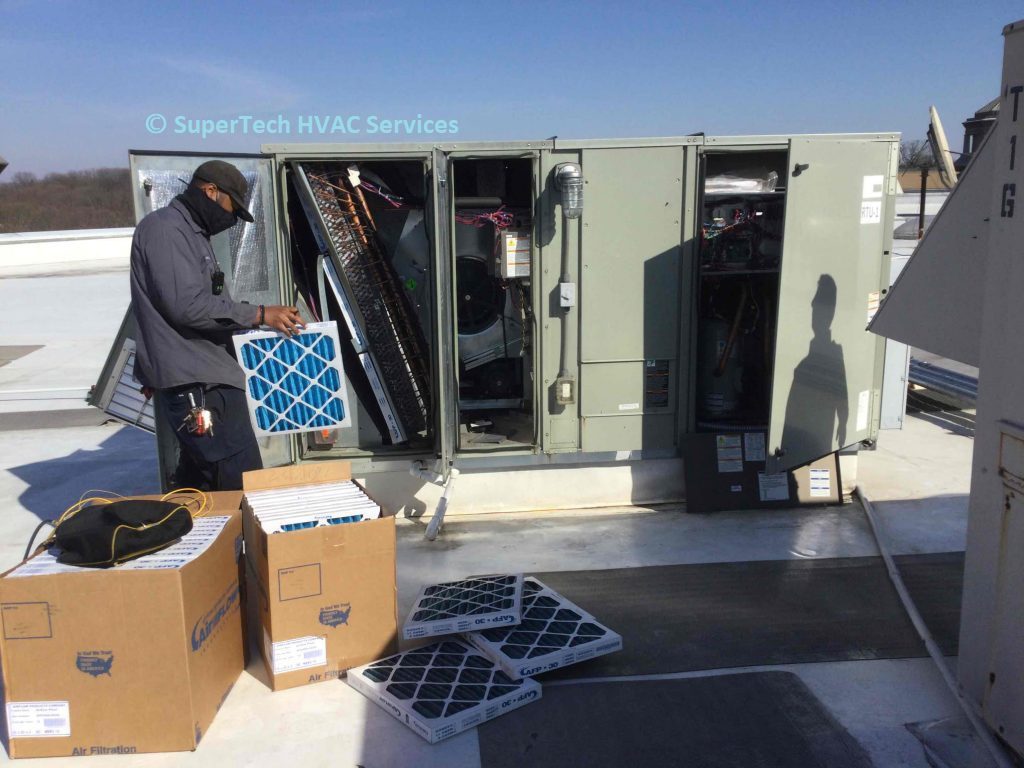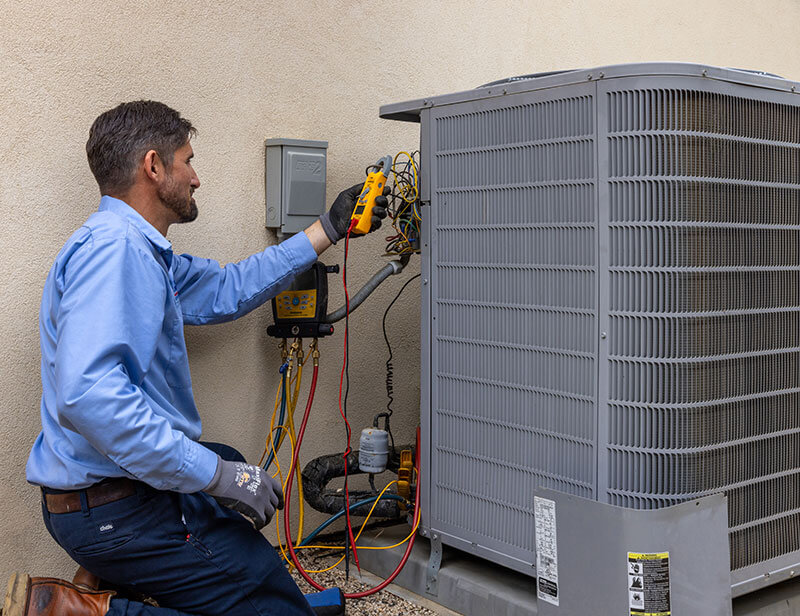Avoid Costly Repairs with Scheduled heat pump service
Avoid Costly Repairs with Scheduled heat pump service
Blog Article
How a Heatpump and Heater Job Together to Optimize Your Home's Home heating Effectiveness
Comprehending how a heatpump and heater interact is crucial for home owners seeking efficient home heating options. Each system has its staminas, providing a well balanced technique to home comfort. The warmth pump stands out in moderate temperature levels, while the heating system supplies fast warmth throughout extreme cold. This harmony not just reduces power expenses but additionally improves the life expectancy of both appliances. What factors influence this cooperation, and exactly how can homeowners optimize their advantages?
Comprehending Warmth Pumps: Exactly How They Function
Lots of individuals may be strange with their internal workings, warm pumps play an important duty in modern heating systems. These tools run by transferring warmth from one location to one more, making use of the principles of thermodynamics. In chillier months, a warm pump removes heat from the outside air, ground, or water, and transfers it inside your home to warm up the home. Alternatively, during warmer months, it can reverse the process, working as an ac system by eliminating warmth from inside to the outside.Heat pumps include an evaporator, development, compressor, and condenser valve. The refrigerant within the system soaks up heat as it evaporates at reduced temperature levels and stress. The compressor after that boosts the stress and temperature level of the cooling agent, permitting it to launch warmth as it condenses. This reliable procedure can substantially lower power intake contrasted to typical home heating approaches, making heatpump a lasting option for climate control in homes.
The Function of Furnaces in Home Heating
Heaters play an essential role in home heating by providing a reputable source of heat throughout the cooler months. They operate by creating warmth with combustion or electric resistance, dispersing it throughout the home using air ducts or radiant systems. The efficiency of a furnace is frequently measured by its Yearly Gas Usage Efficiency (AFUE) ranking, which shows exactly how efficiently the unit converts fuel into heat.Furnaces can utilize various energy sources, consisting of gas, oil, propane, or electricity, enabling property owners to pick the most ideal choice for their needs. Unlike warmth pumps, which may battle in extreme cool, furnaces keep consistent efficiency, guaranteeing that interior temperatures continue to be comfy no matter of exterior conditions. Additionally, modern-day heaters often come outfitted with advanced innovation, such as wise thermostats and variable-speed blowers, enhancing their effectiveness and responsiveness. This convenience makes furnaces a critical component in all-inclusive home heating approaches.

Benefits of Using Both Systems With Each Other
Incorporating the staminas of both furnaces and heat pumps can lead to a more effective and reliable home heating option. Using both systems allows home owners to capitalize on the warm pump's energy performance throughout milder temperatures while relying upon the heating system for more severe cold conditions. This twin technique can greatly reduce power costs, as heatpump take in much less electrical energy than conventional home heating techniques when temperature levels are moderate.Additionally, utilizing both systems together can improve comfort degrees in the home. Heatpump can give consistent, also heating, while heating systems can quickly increase ambient temperature levels when needed. Moreover, the assimilation of both systems can extend the lifespan of equipment by decreasing damage on each unit, as they share the work. Ultimately, house owners can enjoy a well balanced, cost-effective heating remedy that adjusts flawlessly to varying climate condition, ensuring a warm and welcoming home throughout the winter season.
How Warm Pumps and Furnaces Enhance Each Various Other
They create a complementary heating system that makes best use of efficiency and comfort when property owners incorporate warmth pumps and heaters. Warmth pumps run by transferring heat from the outside air or ground, making them highly efficient in moderate climates. They excel during milder temperatures, providing affordable heating. On the other hand, heating systems create warmth through combustion or electric resistance, delivering solid, prompt heat during extreme chilly conditions.The mix of these two systems enables dynamic adjustments based upon temperature fluctuations. Throughout warmer months or milder winter months days, the heat pump can take the lead, conserving energy and reducing costs. As temperatures decline, the heater can flawlessly involve, making sure constant warmth throughout the home. This synergy not only maximizes energy use but also boosts the life-span of both systems, as each device runs within its optimal performance array. Together, they develop a well balanced atmosphere that adjusts to varying climate needs.
Enhancing Efficiency: Tips for Homeowners
Home owners can improve their home heating effectiveness through numerous functional strategies. Developing a regular upkeep routine, incorporating wise thermostat technology, and carrying out effective insulation and securing remedies are key actions. These steps not just improve convenience but likewise reduce power prices.
Regular Upkeep Schedule
To ensure maximum home heating effectiveness, developing a regular upkeep routine is vital for any home. House owners should focus on regular evaluations of both heatpump and furnaces to establish peak efficiency. This includes altering air filters each to 3 months, as clogged filters can considerably reduce effectiveness. Furthermore, organizing professional maintenance at the very least yearly enables technicians to recognize and address potential problems prior to they rise. Property owners must also clean the heatpump's outside device to stop debris build-up that can prevent airflow. By adhering to a regular maintenance routine, house owners not just improve their furnace' efficiency however likewise prolong their life expectancy, causing higher convenience and minimized power expenses throughout the cooler months.
Smart Thermostat Combination
Integrating a smart thermostat into a home furnace can greatly improve energy efficiency, specifically as it permits exact control over temperature settings. These tools can discover the property owner's timetable and choices, immediately adjusting the temperature level to enhance convenience while lessening energy usage. They can decrease home heating during times when the home is unoccupied, lowering unnecessary intake. Numerous clever thermostats likewise provide real-time power usage data, making it possible for house owners to make informed choices about their home heating habits. Furthermore, remote access by means of smartphone apps permits useful reference users to change setups from anywhere, guaranteeing the home is cozy upon return. In general, clever thermostat integration not only boosts convenience yet significantly adds to energy cost savings and performance.
Insulation and Sealing Solutions
Smart thermostats play a critical role in energy performance, but their efficiency can be substantially improved by proper insulation and securing services. House owners should prioritize protecting wall surfaces, floorings, and attic rooms to minimize heat loss. Top notch insulation products, such as spray foam or fiberglass, can substantially improve thermal resistance. Additionally, sealing gaps around doors, ducts, and windows avoids chilly air seepage and warm getaway. Weatherstripping and caulking are efficient approaches for addressing these leakages - ductless mini splits. Regular evaluations for air leaks, along with the use of blower door tests, can aid recognize pop over to this web-site trouble locations. By buying insulation and securing, home owners can maximize the efficiency of their home heating systems, eventually causing minimized energy consumption and reduced energy bills
Usual Myths About Heat Pumps and Furnaces
What false impressions border warmth pumps and heating systems? Numerous individuals mistakenly think that heatpump are inefficient in colder environments. Actually, contemporary heatpump are made to run efficiently even in low temperature levels, supplying reputable heating throughout winter months. Another typical myth is that heaters are always extra reliable than heatpump. Nonetheless, this depends upon the specific power sources and effectiveness ratings of the devices concerned. Some might also assume that using both systems all at once is unnecessary, yet in fact, this combination can maximize heating efficiency, particularly during severe climate condition. In addition, people commonly think that heatpump need consistent maintenance, when in fact, they have comparable maintenance requires to standard heating unit. By exposing these misconceptions, homeowners can make more enlightened decisions regarding their home heating alternatives, ultimately causing boosted convenience and energy effectiveness in their homes.
Upkeep Factors To Consider for Combined Equipments

Frequently Asked Questions
Can Warmth Pumps Job Effectively in Incredibly Cold Climates?
Heatpump can battle in exceptionally cold climates due to decreased effectiveness and warmth removal restrictions. Innovations in technology have actually led to models designed for better performance in such problems, boosting their stability in harsh environments.
How Lengthy Do Warmth Pumps and Furnaces Typically Last?
Heat pumps typically last 15 to 20 years, while furnaces have a life-span of 15 to three decades. Normal upkeep can prolong their longevity, making certain reliable procedure and lowering the requirement for premature replacements.

What Is the Ordinary Expense of Putting Up Both Solutions?
The ordinary cost of mounting both a warmth pump and a furnace usually varies in between $5,000 to $10,000 - heat pump installation ooltewah tn. Elements affecting this cost include system dimension, installation complexity, and local labor prices
Are There Tax Rewards for Making Use Of Energy-Efficient Heating Solutions?
Several property owners make inquiries concerning tax obligation motivations for energy-efficient heater. Numerous government and state programs usually supply credit histories or refunds, encouraging the adoption of sustainable modern technologies to lower power consumption and advertise ecological responsibility.
How Do I Choose the Right Size Heatpump and Heating System?
Selecting the appropriate dimension heatpump and heater entails calculating the home's square footage, considering insulation quality, and assessing regional climate. Consulting an expert can ensure optimal system efficiency and energy effectiveness based on specific needs. furnace replacement. Comprehending just how a heat pump and furnace work with each other is crucial for home owners looking for effective heating solutions. In cooler months, a warmth pump essences heat from the outside air, ground, or water, and transfers it inside to warm up the living area. When house owners incorporate heat pumps and heaters, they create a complementary home heating system that maximizes performance and comfort. Source Warmth pumps operate by transferring heat from the outdoors air or ground, making them extremely efficient in modest climates. Heat pumps can battle in very cold environments due to lowered efficiency and warm removal restrictions
Report this page